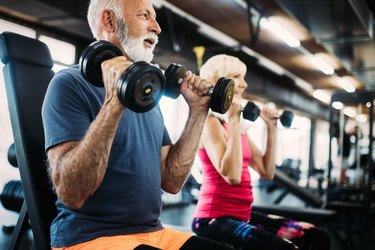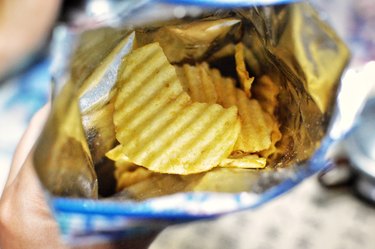
As you reach age 50, your body starts gaining extra inches in your midsection for different reasons, even if the scale really isn't moving. You don't need to simply accept increased belly fat as a consequence of aging, though.
Find out what causes you to accrue abdominal fat as you get older and how to adjust your lifestyle to combat it.
Video of the Day
Video of the Day
1. Decreased Activity and Metabolism
Older adults are more likely to have obesity than younger adults, according to the American Council on Exercise. Men tend to add 3.4 percent to their body weight every 10 years between the ages of 22 and 45, while women typically see a 5 percent gain each decade.
"It doesn't sound like much, but that's the effect of just 150 extra calories per day, " Jenny Champion, RD, CPT, tells LIVESTRONG.com. This slow-but-consistent energy imbalance — consuming more calories than you burn — is the major factor behind weight and belly fat gain.
Not only do most people tend to decrease their physical activity as they get older, per the ACE, but our metabolisms tend to drop as well, which means we burn less calories overall.
Plus, the amount of muscle mass you have declines as you age, especially if you don't strength-train, so you'll end up with a fattier body composition even if the scale doesn't move. This loss of muscle also reduces your metabolic rate, as your body requires more calories to maintain lean muscle than fat. So, you may be eating the same as you did in your 30s, but you're not using as many calories — and the surplus shows up as belly fat.
Related Reading
2. Food Culprits

Your younger self's metabolism may have processed poor food choices more quickly than it does now, but as you age, things like cheeseburgers, beer, fried foods and processed snacks tend to affect your waistline differently.
Refined carbs especially are a major cause of belly fat, obesity and other health issues. These are grain-based foods that have the bran and germ extracted during processing so there's no real fiber or other nutritional value left intact. White bread, pasta and rice, as well as chips, candy, sweets, sugary drinks and alcohol are all good examples. These foods cause sharp spikes in blood sugar and can raise triglyceride levels, according to Harvard Health Publishing, which in turn can lead to more fat stored around the waist.
A review published July 2019 in Medical Hypotheses supports the notion that eating refined carbs is associated with increased rates of obesity as well as insulin resistance, which leads to belly fat.
3. Hormone Dips
Pre-menopausal people — thanks to estrogen — generally store more fat in their hips, thighs and butts to support pregnancy and breastfeeding. But as menopause approaches, according to the ACE, estrogen levels decline and fat redistributes to the belly. A September 2012 review published in Climacteric supports this, concluding that hormonal changes that start even before menopause significantly contribute to increased abdominal obesity.
Similarly, lower levels of testosterone — a result of aging in men — are linked to increased body fat, especially belly fat, per a May 2015 review in Obesity Reviews.
Interestingly, though, men tend to lose their bellies faster than women. "It is easier for men to burn fat because their lean muscle mass is higher," explains Shanna Levine, MD, who is board-certified in internal medicine and owns Goals Healthcare. "Men also lose weight more readily from their midsections, whereas women tend to lose weight from their hips and thighs. Losing abdominal weight improves metabolism as well, whereas the weight women lose does not have the same compounding metabolic effect."
How to Battle the Bulge
1. Combine Cardio and Strength Training
To combat belly fat and excess weight, the Physical Activity Guidelines for Americans recommend that older adults get 150 to 300 minutes of moderate-intensity activity (think: walking or other types of cardio) every week. In addition, strength-train all your major muscle groups at least twice a week. Strength training helps offset the natural loss of muscle mass. Indeed, a study published in December 2014 in Obesity concluded that strength training had the biggest influence on waist circumference change in men.
"As for exercise, it doesn't have to be intense or long; even a walk around the neighborhood every day adds up," Champion says. "Resistance exercises are great for preserving muscle mass, which helps to keep your metabolism as high as possible as you age."
Ready to find the right workout for you? Check out The Best Weight-Loss Exercises for Anyone Over the Age of 50.
2. Clean Up Your Diet
A balanced diet to support a slimmer middle includes lean proteins, whole grains, vegetables, fruit and little to no refined carbs or added sugars, per the Harvard T.H. Chan School of Public Health.
Watch your portion sizes, too, as too much of any food can cause weight gain if you consume more than you burn.
Learn how to safely cut processed carbs and added sugars from your diet, and get to know what healthy portion sizes look like.
3. Cut Back Your Calories
While your food choices are certainly important, you'll ultimately need to burn more calories than you take in to lose weight.
One pound of stored fat contains approximately 3,500 calories, per the Mayo Clinic, so creating a daily 500-calorie deficit helps you lose about 1 pound of fat weekly.
4. Talk to Your Doctor About Hormone Therapy
Hormone therapy may be effective for some women to help mitigate the changes in body composition that come with aging, according to the Mayo Clinic. These treatments come with health risks, too, though. Speak with your doctor about whether this approach might work for you.
- American Council on Exercise: "Is it True that Metabolism Decreases with Age?"
- SFGate.com: "List of Refined Carbs"
- Medical Hypotheses: "Refined Carbohydrates, Phenotypic Plasticity and the Obesity Epidemic"
- American Council on Exercise: "Is Weight Gain During Menopause Inevitable?"
- Climacteric: "Understanding Weight Gain at Menopause"
- Obesity Reviews: "Testosterone and Obesity"
- The American Institute of Stress: "Stress, Cortisones and Abdominal Fat"
- Obesity: "Weight Training, Aerobic Physical Activities, and Long-Term Waist Circumference Change in Men"
- Mayo Clinic: "Counting calories: Get Back to Weight-Loss Basics"
- Mayo Clinic: "Belly Fat in Men: Why Weight Loss Matters"
- Harvard Health Publishing: "Healthy eating for blood sugar control"
- Office of Disease Prevention and Health Promotion: "Physical Activity Guidelines for Americans, 2nd Edition"
- Harvard T.H. Chan School of Public Health: "Obesity Prevention Source: Food and Diet"
- Mayo Clinic: "Hormone therapy: Is it right for you?"